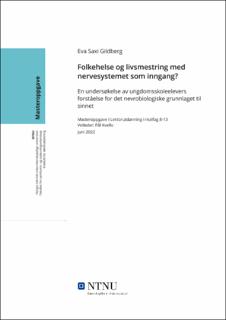Folkehelse og livsmestring med nervesystemet som inngang? En undersøkelse av ungdomsskoleelevers forståelse for det nevrobiologiske grunnlaget til sinnet.
Master thesis
Permanent lenke
https://hdl.handle.net/11250/3014562Utgivelsesdato
2022Metadata
Vis full innførselSamlinger
- Institutt for lærerutdanning [3403]
Sammendrag
Med fagfornyelsen kom Folkehelse og livsmestring inn som ett av tre tverrfaglige temaer. Det innebærer at elevene skal lære mer om psykisk helse på skolen i årene fremover. Flere av de fagspesifikke læreplanene har imidlertid blitt kritisert for ikke å holde mål når det gjelder fokus på psykisk helse. I naturfag går kritikken på at det fokuseres lite på sammenhengen mellom fysisk og psykisk helse, og på hjernen og det biologiske grunnlaget for tanker, følelser og adferd. Naturfaglærere på ungdomskolen har imidlertid en gylden mulighet til å ta opp tematikken i forbindelse med undervisning om nervesystemet. For lærere som ønsker å gjøre det, kan det være nyttig å ha innsikt i elevenes forkunnskaper.
Denne studien har som formål å undersøke ungdomsskoleelevers forståelse for det nevrobiologiske grunnlaget til sinnet. Studien baserer seg på responsen til 149 elever på 9. og 10. trinn på en digital spørreundersøkelse, og to gruppeintervjuer med til sammen 9 elever på 10. trinn. Resultatene indikerer at det er stor usikkerhet blant elevene knyttet til det nevrobiologiske grunnlaget til sinnet. Dette gjelder både for overordnede spørsmål, som hvorvidt sinnet vårt er knyttet til noe fysisk i kroppen, og for mer komplekse spørsmål, som hvorvidt nervesystemet vårt kan endre seg eller ikke. Samtidig viser resultatene at flere elever også har noen forkunnskaper knyttet til de fleste temaene som ble undersøkt i studien. With the curriculum reform, LK20, a new interdisciplinary theme was included with the aim of improving students competence when it comes to public health and life skills. This involves that students are supposed to learn more about mental health in the years to come. However, the curricula goals of several subjects have been criticised for falling short when it comes to mental health. In science the critic is aiming towards the lack of focus on the relationship between mental and physical health, and on the brain and the biological basis of thoughts, feelings and behaviours. However, science teachers have the opportunity to highlight this thematic when teaching about the nervous system. For teachers who wish to do this it can be useful to know something about the students prior knowledge.
The aim of this study is to investigate the understanding of lower secondary school students of the neurobiological basis of the human mind. The study is based on the response of 149 ninth and tenth graders on a digital questionnaire, and two group interviews with in total 9 tenth graders. The results indicate that there is great uncertainty among the students when it comes to the neurobiological basis of the mind. This applies to both basic questions, such as whether the mind is associated with the physical body, and to more complex questions, like whether the nervous system has the ability to change. At the same time the results show that several students also have some prior knowledge regarding most of the topics that were investigated in the study.
